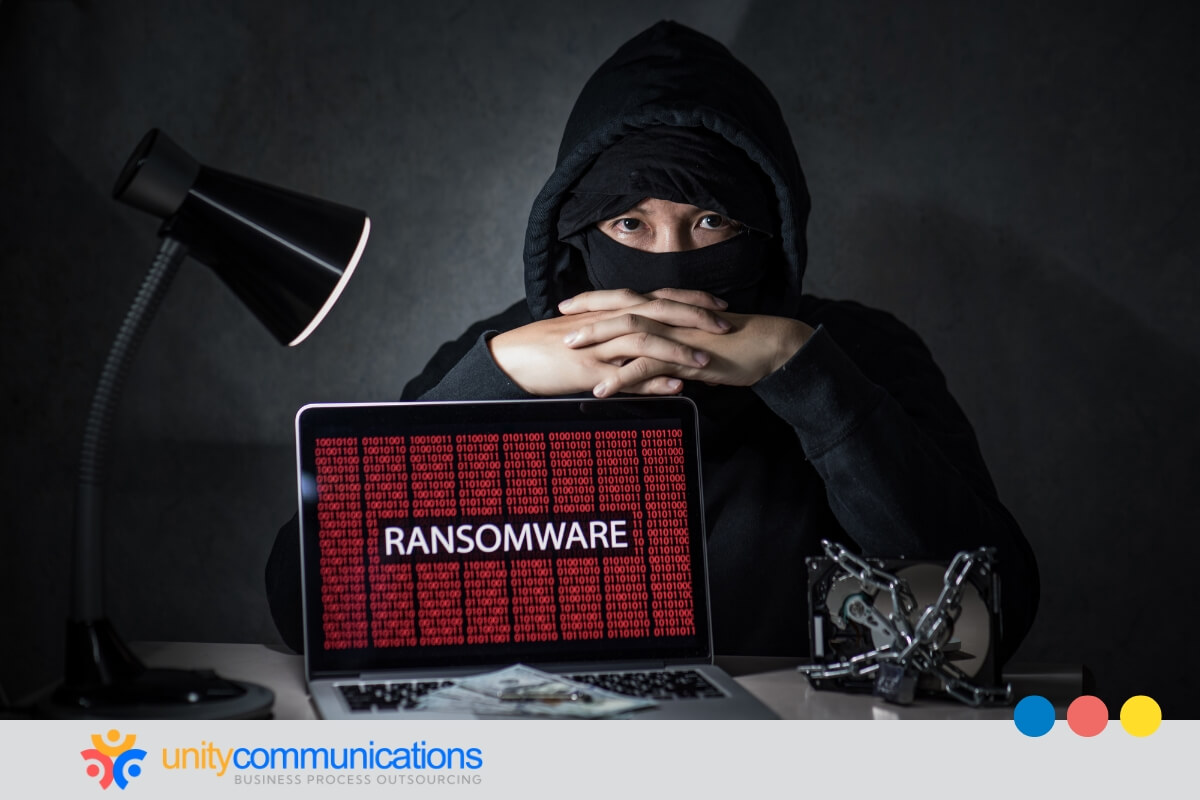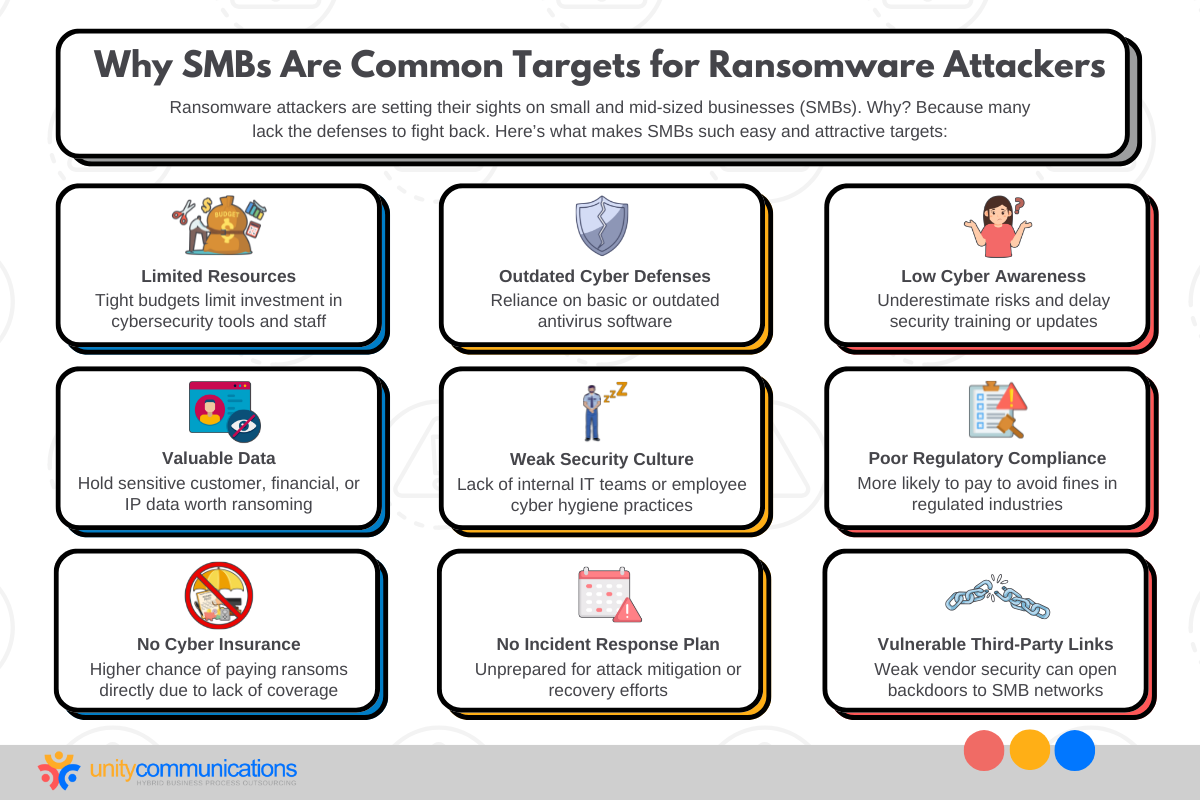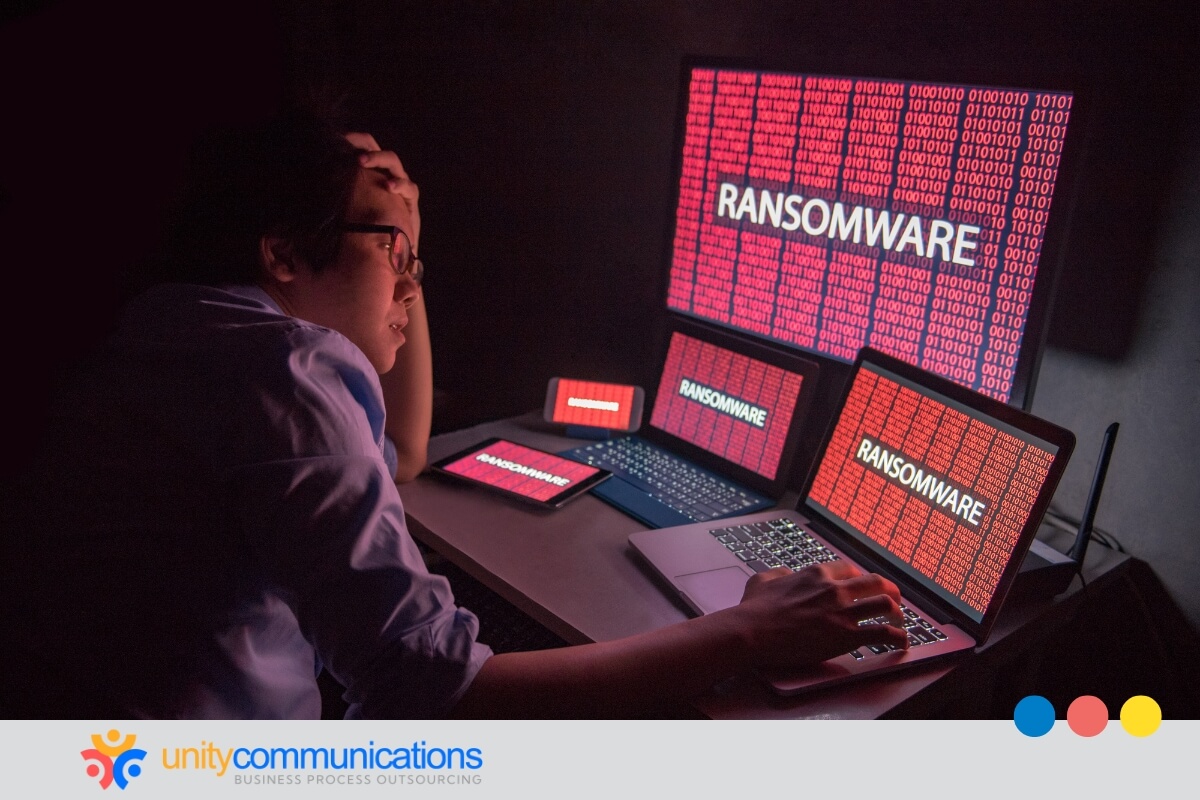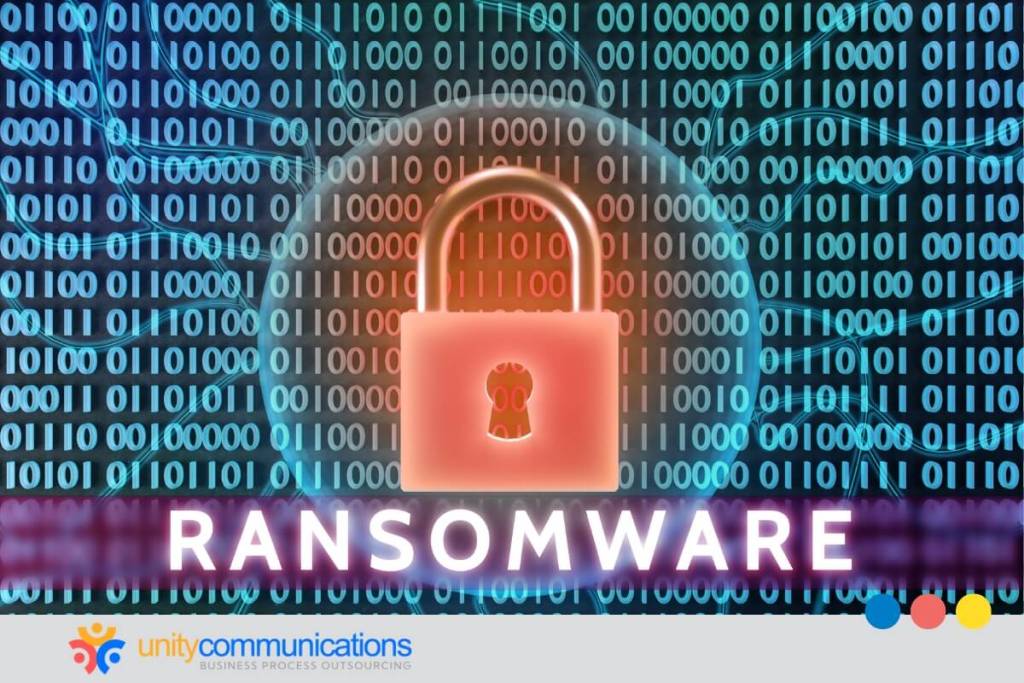Table of Contents
Learn more about outsourcing services for Phoenix businesses. Watch the video below.
As cybersecurity threats continue to rise, safeguarding the interests of small and medium-sized businesses (SMBs) in Dallas has become vital.
Specifically, ransomware attacks loom as a risk, capable of inflicting severe financial and reputational damage. Outsourcing information technology (IT) processes to a BPO provider in Dallas, Texas, emerges as a strategic lifeline among the defenses available.
This article explores the pivotal role of IT outsourcing in providing ransomware protection for Dallas SMBs. It discusses the severity of the issue, the reasons threat actors target small businesses, and the benefits of IT outsourcing.
Stay on this page to discover more.
The Ransomware Menace: A Serious Threat to SMBs

The growing danger of ransomware attacks is a significant issue in today’s business environment. These hostile assaults can potentially interrupt operations, steal sensitive data, and cause substantial financial and reputational harm.
According to Cybersecurity Ventures, ransomware damages are predicted to cost the globe $20 billion in 2021, up from $325 million in 2015. Based on this exponential spike, the cybersecurity research group sees damage costs reaching roughly $265 billion annually by 2031.
Startups and SMBs are more susceptible to attacks due to their limited resources and cybersecurity safeguards. Ransomware attackers typically strike lesser-known companies to exploit weaknesses and demand payments.
Understanding Ransomware
Ransomware attacks are malicious efforts to encrypt an organization’s data, making it inaccessible. In exchange for the decryption key, perpetrators seek a ransom, generally in Bitcoin. If the victim pays, they might be able to regain access to their data.
Cybersecurity Ventures notes that low conviction rates and victims’ readiness to pay have caused the surge in ransomware attacks over the years.
However, settling the ransom is dangerous and fails to ensure data recovery. Ransomware attacks might result in considerable financial losses, data breaches, operational interruptions, and adverse publicity for a business.
Why SMBs Are Common Targets for Ransomware Attackers

Ransomware perpetrators increasingly target SMBs in today’s digital world. The reasons for such a pattern are many and based on the inherent vulnerabilities that SMBs frequently confront.
The following are reasons why SMBs remain attractive targets for ransomware intruders:
- Limited resources. Small firms frequently run on limited resources compared to larger enterprises, making necessary cybersecurity investments difficult. With a restricted budget, organizations might prioritize other critical areas above cybersecurity, such as marketing or staff compensation.
- Insufficient cybersecurity assets. Numerous small businesses lack the cybersecurity systems to defend against advanced assaults. They might depend on antiquated security measures or simple antivirus software to avoid threats. Cybercriminals know these flaws and use them to access small company networks.
- Minimal cybersecurity awareness. Small business owners must know about constantly changing cybersecurity trends. They might underestimate the seriousness of cyber threats or think that only big companies are vulnerable. This lack of understanding might cause complacency and an inability to implement critical security measures.
- Lucrative data. Regardless of size, businesses frequently possess valuable data from which hackers can profit. Lucrative data include customer information, financial records, and intellectual property. Internet criminals recognize that even a tiny company can contain financially beneficial information.
- Poor security cultures. Small enterprises likely have inferior security cultures compared to large organizations. They need more committed IT professionals and cybersecurity processes. Prioritizing a cybersecurity culture means employees can spot and respond to attacks, making it harder for hackers to capitalize on human mistakes.
- Restricted legal and regulatory compliance. Many industries, such as healthcare, banking, and legal services, involve stringent regulations. Noncompliance leads to sanctions and legal ramifications. Threat actors know that non-adhering SMBs are more likely to pay a ransom to avoid regulator investigations.
- Inadequate cybersecurity insurance. Numerous SMBS do not invest in cybersecurity insurance, exposing them to the financial consequences of a ransomware attack. Hackers might be more motivated to target small companies since victims are more willing to pay ransoms without insurance protection.
- Lacking incident response plans. Small-scale companies frequently struggle to implement extensive incident response strategies. When cyberattacks strike, they might fail to immediately control and reduce the damage. Cybercriminals know this flaw and might profit from the confusion that follows an assault.
- Third-party exposure. SMBs frequently work with third-party suppliers, which might pose new risks. Cybercriminals might intrude on these vendors to access small business networks. SMBs must properly verify their external partners or implement stringent cybersecurity rules to prevent fraudsters from exploiting these links.
The Ransomware Strike on the Big D: The Need to Protect Dallas SMBs

Ransomware protection for Dallas SMBs became more critical when hackers attacked Texas’ third-most populous city in 2023, exposing the personal information of 30,253 individuals. City officials revealed that the assault infected some of its servers, according to Sangfor Technologies.
The blog reports that Dallas’ local government security monitoring systems determined a breach within the municipal area. The City of Dallas became aware of a message threatening to leak city data from what appeared to be the Royal ransomware group.
The Royal ransomware group is reported to enter networks by exploiting weaknesses in internet-connected devices and using phishing tactics to get early access to business networks. It threatened to release volumes of employee personal information (e.g., phone numbers, addresses, and credit cards), court cases, medical information, and state documents.
When the ransomware assault hit, it disrupted vital parts of the city. Several servers were hacked during the attack, while more were purposely pulled offline to stop the dangerous malware from spreading. The attack impacted the following organizations:
- 311 Customer Service app
- Code Compliance Services
- Dallas Animal Services
- Dallas City Courts
- Dallas Water Utilities
- Development Services
- The City Secretary’s Office
- The Dallas Police Department
The City of Dallas and cybersecurity experts also reported the following:
- Hackers stole over 800,000 computer files.
- 1.2 terabytes of data were taken from around 1,000 systems.
- Although about 99% of the data was retrieved, 100 servers were pulled from the city’s network.
- The city budgeted $8.6 million for credit monitoring services for those affected to improve software security.
Ransomware Protection for Dallas SMBs Through IT Outsourcing

What is IT support when facing a ransomware attack? This function is essential for data recovery, damage mitigation, and operation restoration.
Technical assistance is part of IT outsourcing that involves enlisting a third-party provider, such as a business process outsourcing (BPO) company, to oversee various aspects of an organization’s technology infrastructure.
What is BPO’s role in mitigating cyberattacks in the world’s most progressive cities, such as Dallas? A service provider has the expertise, technology, and human resources to enhance ransomware and malware protection for Dallas SMBs.
Many BPO providers offer their services through offshoring (e.g., outsourcing to the Philippines) and nearshoring (e.g., outsourcing to Mexico). Both approaches offer advantages that empower SMBs to strengthen their defenses against ransomware. Check out these perks below.
Employing Third-party Security Specialists to Help Resist Hackers
A reputable BPO company can provide competent, experienced cybersecurity professionals to ensure ransomware protection for Dallas SMBs. Third-party teams include:
- Malware analyst
- Security consultant
- Computer forensic analyst
- Incident manager
- IT security specialist
- Network security engineer
- Information security analyst
- Machine learning (ML) engineers
- Security administrator
- Database administrator
These dedicated workers have extensive experience in various fields. They understand cybercriminals’ techniques, practices, and procedures. When constructing a diversified cybersecurity team, organizations of any size can benefit from the help of experts.
Due to a lack of technical talent, building an in-house cybersecurity team is challenging. The World Economic Forum (WEF) estimates that the current international data security personnel gap exceeds 2.7 million roles.
Acquiring first-rate cybersecurity professionals to fortify ransomware protection for Dallas SMBs is achievable with outsourcing. Service providers can promptly field client companies with the needed personnel.
Providing Scalable Cybersecurity Solutions to Reduce Costs
Scalable IT outsourcing operations enhance ransomware protection for Dallas SMBs. Without disrupting company operations, the BPO provider can grow or reduce the number of third-party specialists, skills, or procedures. It assists a Dallas enterprise in effectively managing its business development and financial resources.
Here is how scalable data security defense operations optimize ransomware protection for Dallas SMBs:
- Distribution. Scalability involves distributing online security operations between the BPO provider and the company’s IT support unit. When the in-house staff is unavailable, third-party workers manage the process. This approach enables round-the-clock network monitoring, increasing cybersecurity defenses.
- Cost-efficiency. Scalability lets Dallas organizations hire only the required people, lowering payroll costs when outsourcing IT, web security, and other activities. The BPO provider can also recommend the best third-party people to improve performance, reduce operating costs, and boost cybersecurity protections.
Rolling out Affordable, Dependable Remote Experts to Manage Budget
One of the benefits of outsourcing for small businesses is quick access to skilled and affordable remote workers. In particular, BPO companies in the Philippines and Mexico offer remote personnel with hard and soft skills to reinforce ransomware protection for Dallas SMBs.
The table below shows the information security analyst (ISA) wages in the Philippines, Mexico, and Dallas (Texas, U.S.). It illustrates the significant cost savings associated with IT outsourcing.
| Country | Average Salary of an Information Security Analyst (in U.S. dollars) |
|---|---|
| The Philippines | $901.58 |
| Mexico | $2,151.59 |
| Dallas, Texas (U.S.) | $7,912 |
Salary data for the Philippines and Mexico come from Salary Explorer, while the amount for Phoenix, Arizona (U.S.), comes from Indeed. (Salaries were translated from Philippine pesos (PHP) and Mexican pesos (MXN) to U.S. dollars ($) to ensure consistency.)
So, engaging an ISA from a BPO provider in the Philippines rather than Dallas can save $7,010.42 ($7,912 minus $901.58) monthly. Bear in mind that these are only estimations. For specific pricing and other information, contact a BPO provider.
Driving Data Compliance to Avert Stiff Regulatory Penalties
The BPO partner supports ransomware and other cybersecurity protection for Dallas SMBs by strictly complying with government laws and industry policies, such as:
- The Payment Card Industry Data Security Standard (PCI DSS)
- The General Data Protection Regulation (GDPR)
- The Federal Information Security Management Act (FISMA)
- The Health Insurance Portability and Accountability Act of 1996 (HIPAA)
Regulatory violations can lead to litigation and adverse publicity, affecting the company’s finances and reputation.
IT outsourcing improves compliance initiatives by:
- Detecting potential breaches. Third-party analysts are technically skilled in assessing data for anomalies or irregularities that might suggest infractions.
- Speeding up procedures. IT outsourcing combines the latest technology and professional expertise to simplify data evaluation procedures, accelerating compliance activities.
Assisting Business in Focusing Core Business to Increase Sales
The BPO provider deploys ransomware and other data security protections for Dallas SMBs. This capability means organizations can focus more on improving revenue-generating activities, such as customer service, and elevating the customer experience (CX).
With more attention to enhancing CX, Dallas businesses can:
- Improve brand image. A solid reputation helps businesses gain a competitive market edge, strengthening their market position. Robust public perception also increases customer retention.
- Attaining better sales. Hiring a BPO partner to handle cybersecurity concerns frees time. It can enable Dallas businesses to focus on CX projects to improve buyer journeys and raise sales. Satisfied customers are more likely to share their pleasant experiences with the company, which can attract new customers.
Alternatively, businesses can invest more time and resources to develop and enhance their products and services, boost marketing campaigns, and more.
Shouldering Operating Costs for More Available Funds
Explore how outsourcing ransomware protection can provide Dallas SMBs with more investment funds:
- Physical and digital resources. The BPO partner utilizes its infrastructure for cost-effective online security services, eliminating the need for extra equipment, workspace, and computers.
- Recruitment. Collaboration with a service provider reduces hiring expenses. The IT outsourcing partner handles time-consuming and costly procedures such as talent scouting, screening, and onboarding.
- Salaries. Recruiting additional workers results in higher wages. With IT outsourcing, the BPO provider covers salaries, taxes, health insurance, and other related costs.
- Skills enhancement. The BPO partner invests in staff training to enhance cybersecurity capabilities. Third-party specialists stay updated on tech trends, online threats, security, laws, and industry norms.
Valuable IT Outsourcing Tips for Dallas SMBs

The BPO space is diverse, with numerous third-party providers offering different outsourced services. Follow these six steps to identify the best partner to optimize IT and cybersecurity processes, including ransomware protection for Dallas SMBs:
- Establish objectives and standards. Build and assess outsourcing plans, such as weighing the pros and cons of outsourced IT services. Decide the most appropriate third-party team size, communication channels (e.g., social networks, phone calls, live chat), and outsourcing model (offshore or nearshore).
- Evaluate verified prospective BPO partners. Execute a thorough assessment of potential third-party partners. Scrutinize their credentials, history, skills, and data security measures. Look for reliable, skilled providers for outsourced IT services.
- Generate an extensive list of service fees. To effectively oversee the outsourcing budget, obtain a comprehensive list of service costs, extra charges, and concealed expenses from each potential BPO partner. Measure and compare their service rates and pricing structures.
- Write a request for proposal (RFP). Reduce the number of applicants. Provide an RFP to each interested third party on the short list. In the RFP, incorporate the extent of the outsourced work, timeframes, financial limits, and possible approaches for likely challenges.
- Pick the BPO partner that matches standards. Draft a service-level agreement (SLA) with the new partner specifying the required quantity and type of assistance. The SLA describes the parameters under which the outsourced IT activities will be performed, including key performance indicators (KPIs).
- Build and maintain communication with the partner. Review the BPO partner’s output and efficiency concerning the SLA. Engage with the third-party vendor’s management online or in person about developments and objectives.
The Bottom Line
Shielding Dallas SMBs from ransomware threats necessitates a strategic approach. IT outsourcing emerges as a pivotal defense mechanism. Small businesses often grapple with limited resources and online vulnerabilities. With BPO providers, SMBs can access expert cybersecurity solutions, cost-effective services, and scalable resources.
IT outsourcing also encompasses continuous monitoring, rapid threat response, and secure data backup. It solidifies ransomware and other cybersecurity protection for Dallas SMBs, ensuring data safety and business continuity and safeguarding against financial and reputational damage from cyber threats.
Let’s connect if you want to learn more about ransomware protection for Dallas SMBs!




